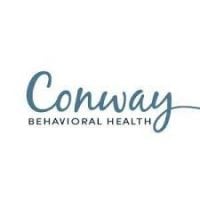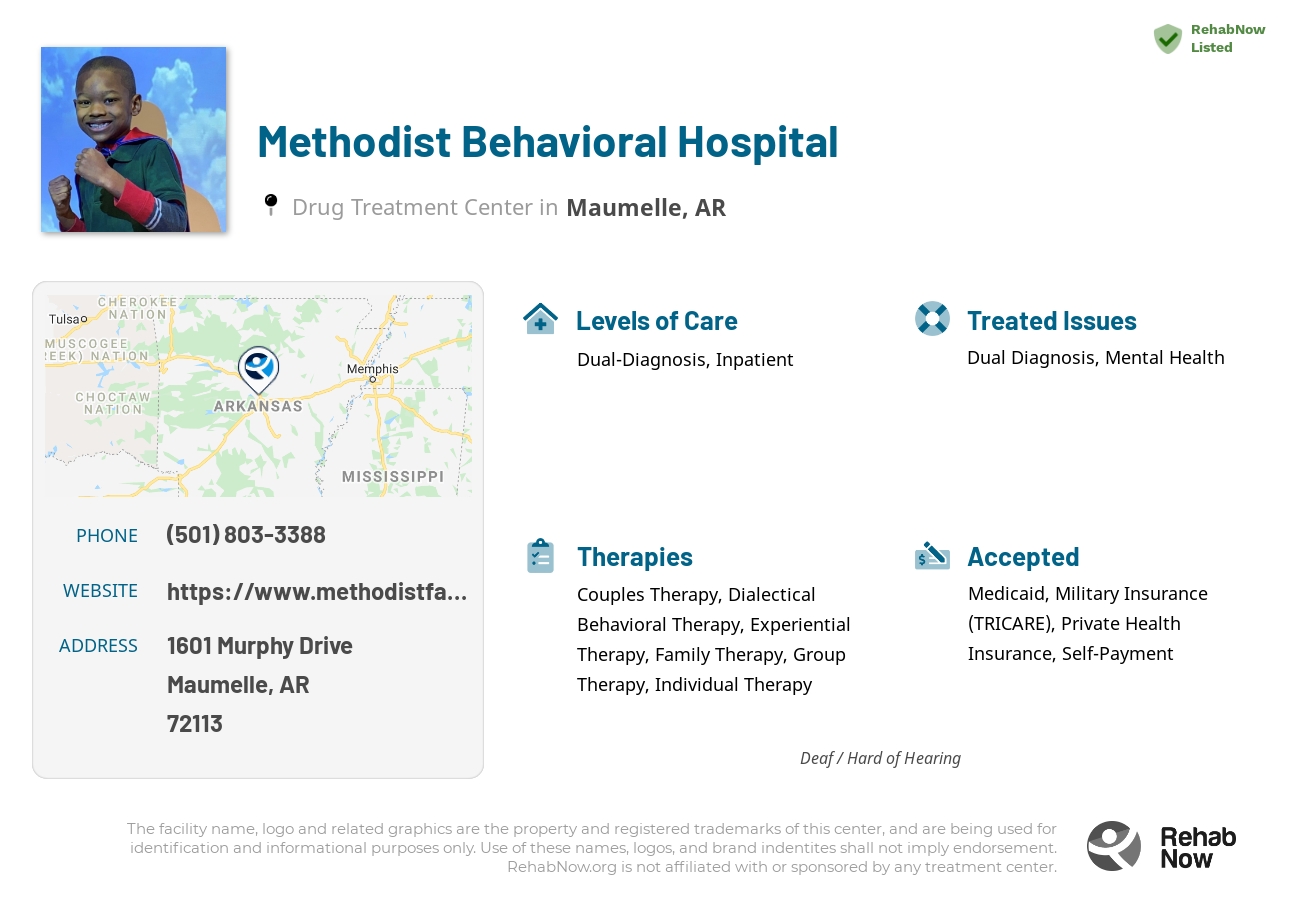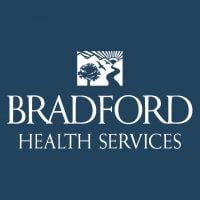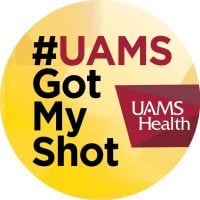
Methodist Behavioral Hospital
Drug Rehab Center in Maumelle, Arkansas
- Mental Health
- Dual Diagnosis
Methodist Behavioral Hospital in Maumelle, Arkansas is a JCAHO accredited addiction treatment facility offering inpatient and aftercare support, providing comprehensive, holistic care with tailored evidence-based treatments and support services.
About This Arkansas Facility
Methodist Behavioral Hospital, located in Maumelle, Arkansas, is a beacon for behavioral health care, specifically tailored for children and teens. This facility stands out not only for its specialized focus on a younger demographic but also for its integrative approach to treating addiction alongside psychiatric conditions. With 60 beds, it offers a wide spectrum of care including inpatient, outpatient, and day treatment programs designed to meet clients at various stages of their recovery journey.
This hospital is recognized for its commitment to quality and safety, as evidenced by its JCAHO accreditation and State of Arkansas license. These accreditations underscore its dedication to meeting strict standards in providing health care services. At Methodist Behavioral Hospital, the care continuum is thoughtfully designed to address the psychiatric, behavioral, and emotional needs of its young patients, blending evidence-based treatments with therapeutic education and family involvement.
- Tailored treatment plans for children and teens emphasize the importance of early intervention and specialized care.
- A comprehensive continuum of care ensures that each client’s unique journey towards healing and recovery is fully supported.
- The institution is committed to excellence in behavioral health, as demonstrated by its notable accreditations and licensure.
Methodist Behavioral Hospital has a strong focus on treating a range of issues, from dual diagnosis and mental health concerns to various forms of addiction, including alcoholism, drug addiction, substance abuse, and opioid addiction. Treatment methods incorporate cognitive behavioral therapy, dialectical behavior therapy, medication management, and more, across inpatient, outpatient, and day treatment levels of care. This holistic and integrative approach ensures that all young patients receive the support necessary to navigate their path to sobriety and wellness.
Genders
Ages
Modality
Additional
Accreditations
State License

JCAHO
Conditions and Issues Treated
When addiction and psychiatric issues co-occur, the addict’s recovery is more successful when both conditions are treated. A dual diagnosis refers to a condition in which the patient is diagnosed with two health issues: addiction and bipolar disorder. The most common therapies are psychotherapy, behavioral therapy, spiritual counseling, 12-step programs, and medication management.
Levels of Care Offered at Methodist Behavioral Hospital
This center offers a variety of custom treatment tailored to individual recovery. Currently available are Dual-Diagnosis, Inpatient, with additional therapies available as listed below.
Inpatient treatment centers offer a safe, secure, and often medically supervised environment for drug or alcohol-addicted individuals. Many of these facilities are equipped to provide detoxification, treatment for co-occurring mental health disorders, and aftercare programs. The patient typically spends 28 to 30 days at the facility and will receive extensive drug counseling.
Therapies & Programs
At Methodist Behavioral Hospital , to learn from past mistakes and improve one’s situation, the recovering person meets individually with a therapist. The counselor or therapist will address addiction causes, triggers, mental issues, dual diagnosis, and aftercare plans during this time. This is a very intense and challenging process. Some clients find it easier to open up to someone other than family or friends who understand their struggles with addiction.
Couples therapy sessions are typically used to help couples in recovery from drug addiction work through their issues. These types of sessions can be beneficial for many reasons, including the fact that they add a layer of accountability when both partners in a couple are recovering from addiction.
Therapy can also provide addicts with another effective way to cope with stress and avoid relapse during difficult situations. This type of therapy can help improve communication with their partners, which can strengthen the relationship and prevent future problems that might lead to relapse.
Family therapy is a crucial part of drug treatment and getting sober. It is one of the most effective ways to help addicts stay on the path to long-term sobriety. An addict’s family can play a vital part in helping them to avoid relapse. They can spot the warning signs and help them get back on track.
In group therapy, recovering addicts meet with a therapist and other people in recovery. Some groups are closed, meaning only people who share the same addiction or problem can attend. Others are open to anyone who wants to stop using drugs or drinking alcohol. Group therapy sessions typically focus on one topic each week or month so that recovering addicts can discuss issues they face daily.
Dialectical Behavior Therapy (DBT) is a type of therapy created in the late 1980s and early 1990s. It was designed to help people with high rates of suicidal behavior.
The goal of DBT is to teach mindfulness, distress tolerance, emotion regulation, and interpersonal effectiveness to help people learn how to live a life that is no longer controlled by overwhelming emotions and urges.
DBT is beneficial in treating drug addiction because it helps patients understand and cope with their cravings for drugs or alcohol rather than turning to those substances as a way of coping.
Cognitive Behavioral Therapy (CBT) is based on the idea that how we feel, think and act all interact together. It helps people explore their thoughts for problems (or false beliefs) that influence their mood and actions. CBT is very goal-oriented, which means that the therapist and patient work together on a specific problem. In addition to helping a client focus on thoughts that can be changed, CBT also allows them to take an active role in their treatment. Our thoughts determine our feelings and behaviors; our feelings affect our thoughts, and our behaviors change our thoughts and feelings.
Patient Experience
Experiential Therapy at Methodist Behavioral Hospital
Experiential Therapy is a different way of thinking about addiction treatment. It uses physical activities to help work through troubling emotions, memories, and trauma that are sources of psychological issues like addiction.
Experiential Therapy can be an effective option for those who have struggled with past traumas or challenges associated with life decisions such as drug use. The non-traditional approach helps people deal more effectively with these struggles. It also allows them to gain new perspectives on their behavior patterns by recreating experiences in healthy ways rather than continuing old habits that may no longer serve them.
Payment Options Accepted
For specific insurance or payment methods please contact us.
Is your insurance accepted?
Ask an expert, call (888) 674-0062
Associated Centers
Discover treatment facilities under the same provider.
- Alano Society in Valley City, ND
- Discovery Point Retreat - Waxahachie in Waxahachie, TX
- ARC - Arizona Rehab Campus in Tucson, AZ
- The Lighthouse Community - San Diego in San Diego, CA
- Defining Wellness Centers in Brandon, MS
Learn More About Centers
Additional Details
Specifics, location, and helpful extra information.
Maumelle, Arkansas 72113 Phone Number(501) 803-3388 Meta DetailsUpdated April 15, 2024
Staff Verified
Patient Reviews
There are no reviews yet. Be the first one to write one.
Maumelle, Arkansas Addiction Information
Arkansas has one of the highest rates of substance abuse and addiction in the nation for drug overdoses. Methamphetamines and prescription opioids are by far the most widely abused drugs in the state. Despite the high rates, Arkansas ranked only 25th in the for drug overdose deaths in 2013.
Treatment in Nearby Cities
- Heber Springs, AR (47.2 mi.)
- Huntsville, AR (112.9 mi.)
- Oxford, AR (96.6 mi.)
- West Memphis, AR (126.6 mi.)
- Melbourne, AR (86.3 mi.)
Centers near Methodist Behavioral Hospital



The facility name, logo and brand are the property and registered trademarks of Methodist Behavioral Hospital, and are being used for identification and informational purposes only. Use of these names, logos and brands shall not imply endorsement. RehabNow.org is not affiliated with or sponsored by Methodist Behavioral Hospital.








